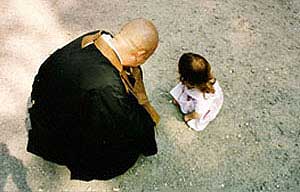Spiritual awakenings
BY ROBIN EVANS, San Jose Mercury News, March 5, 2005
Early spiritual experiences for children can provide the foundation for a lifelong sense of identity and purpose
SAN JOSE, Calif. (USA) -- The young daughters of Jessie and Andrew Hsu are hard-pressed to explain the meaning of the Tibetan Buddhist chants the family recites on Friday nights. But it's obvious they like it. Omar Omeira, 2, can't yet ask why his parents, Helal and Abbake, bow to the floor five times a day in their Santa Clara, Calif., home, but he, too, raises his hands in supplication to Allah.

<< Whether grounded in a particular religion or not, spiritual practices are being increasingly recognized for their positive effects on children
Children need not understand such rituals to benefit from them: There is growing evidence that they are naturally attuned to the spiritual and that early experiences can provide the foundation for a lifelong sense of identity and purpose.
Nearly all children experience ways of knowing and being outside of any training or rituals, according to a new study by psychologist Tobin Hart, author of "The Secret Spiritual World of Children."
They include awe and wonder, intense feelings of love and compassion, startling moments of wisdom and a deep curiosity about the profound nature of life.
It took only a few days of reciting the sutras along with their mother before Hsu's girls, ages 5 and 8, began asking "why?" said Jessie Hsu. "I tell them it's wisdom from the Buddha."
John Riemenschnitter, an associate pastor at the Highway Community Church in Mountain View, Calif., remembers his 7-year-old son Kyle lavishing unusual care and compassion on his 5-year-old brother Trevor when he returned from the hospital last year after treatment for a leg infection.
"Somehow in that crisis, it stirred something up in him," Riemenschnitter said.
Adults can help their children develop spiritually by acknowledging their questions, tender feelings and experiences of a spiritual nature. That instantly establishes a mutual respect that reinforces the child's identity and self-esteem, Hart said.
"We often think of kids as amoral or not having an ethical foundation, so we have to teach them," he said. "But as soon as we begin to understand children as spiritual beings with spiritual lives, we have to treat young people with respect.
"One of the things we've heard from parents is how much their children are spiritual teachers for them. It's not hard to find a parent who says, 'I teach my kids how to brush their teeth, but from them I'm learning patience and unimaginable love.' "
Hart is co-founder of the ChildSpirit Institute, a Georgia-based nonprofit agency leading a movement of academics and parents dedicated to exploring and nurturing the spiritual life of children. It hosted the second annual U.S. conference on the topic last fall in Pacific Grove, Calif.
What people are learning, he said, is that "if we're going to nourish spirituality as parents, in religion or the classroom, as much as we want to show them the good life from outside in, we need to draw equally from the inside out."
One way to do that is through stories that resonate with a child's inherent sense of fairness and compassion, such as those of Jesus, Buddha, Muhammad and other saints and prophets, or the good deeds of everyday people, past and present. Prayers, chants or spiritually grounded behavior are other ways.
Whether grounded in a particular religion or not, spiritual practices are being increasingly recognized for their positive effects on children.
Jodi Beth Komitor, founder of Next Generation Yoga and author of "The Complete Idiot's Guide to Yoga With Kids," recommends yoga instead of Ritalin to calm anxious children. "Parenting With Spirit" by Jane Bartlett is one of several new books that lay out ways to nurture a side of children too little recognized.
In the new book "Baby Buddhas," Lisa Desmond, a New England woman who develops meditation programs for elementary school children, says meditation can become a lifelong tool for finding "balance, harmony and knowingness within." Her "Cleansing Breath Meditation," for example, gives children a method for letting go of thoughts and feelings that make them feel sad, mad or bad.
San Jose psychologist Michael Jones says there are benefits in any routine, whether going to church or some sort of meditative practice that supports a healthy home environment or helps children calm themselves.
Jones says it's largely the parents' warm and accepting attitude toward ritual practices that nourishes and calms children. But Hart thinks the routines do much more even for toddlers too young to understand them.
"Sometimes the real job of it is to shift consciousness," he said. "A child might not have any idea of the words of a chant, but the rhythm, ritual and energy of the community lets him shift states, slow down the mind and open up to this wellspring of wisdom and wonder."
The infants to 2-year-olds at Christ Community Church of Milpitas, Calif., learn the message of Jesus Christ simply by experiencing it in the love and kindness shown by the adults in charge of the nursery, said children's ministry director Brenda Santa Cruz.
Charlie Chao, who hosts the South Bay Tibetan Buddhist meetings at his Cupertino, Calif., home, says his children, ages 2 and 4, don't yet understand that the songs they sing on Friday nights are philosophical teachings.
"They don't think it's a prayer, just a song or something," he said. "But they sing all the time when they are happy."


